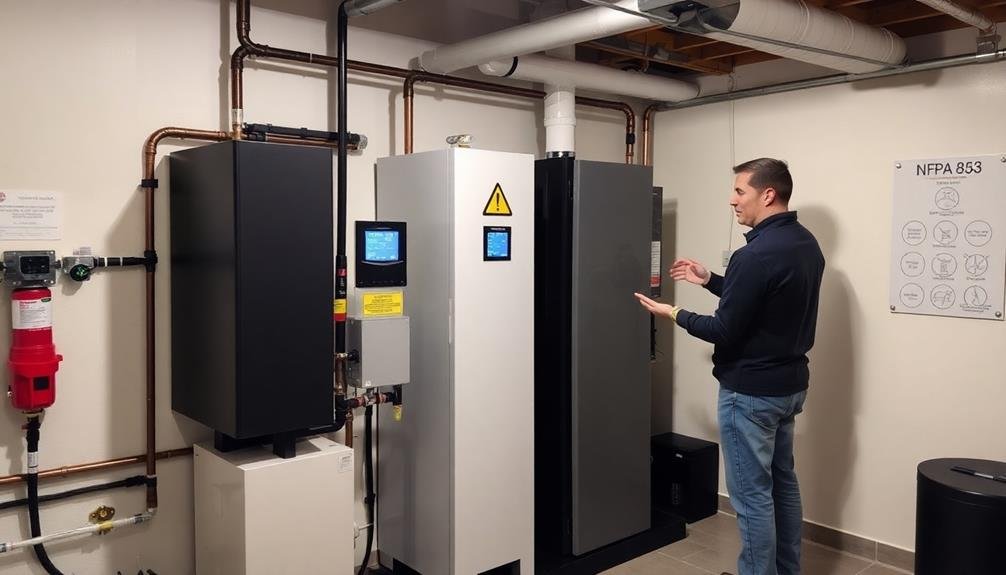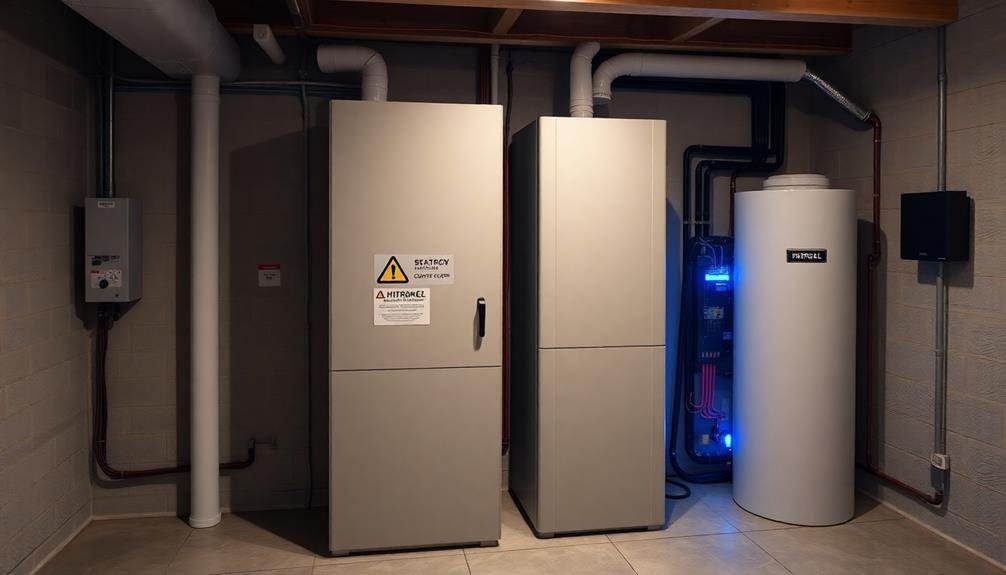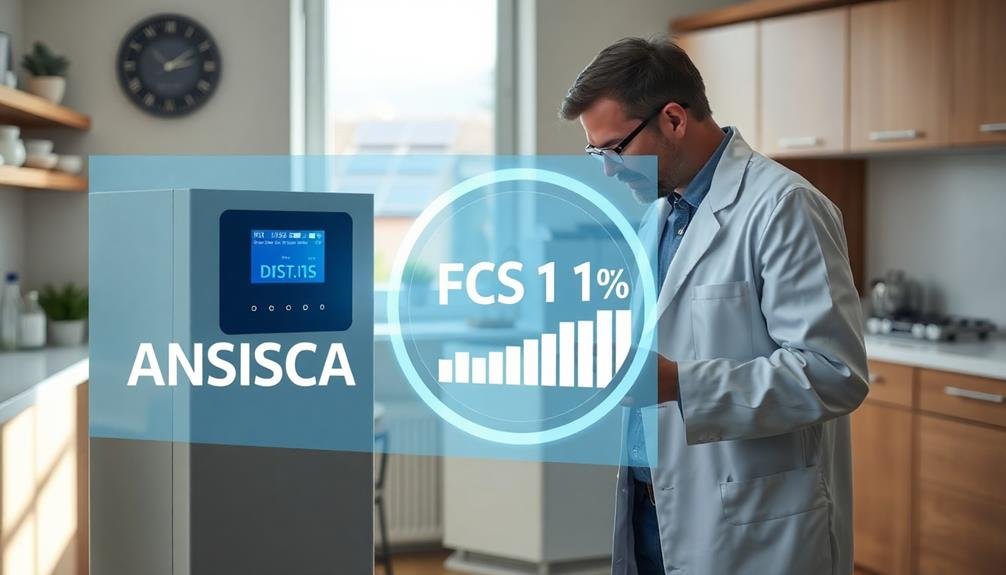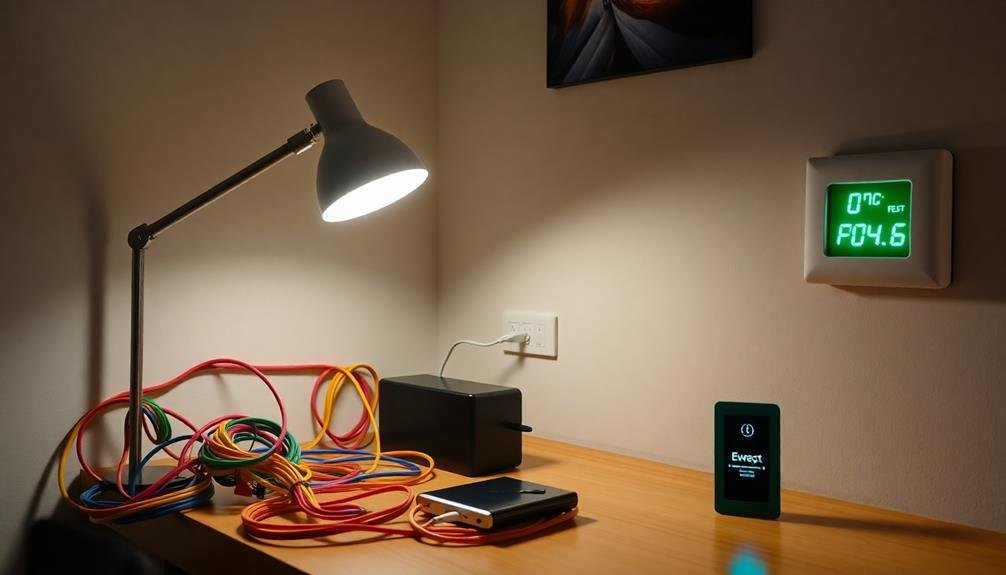The five best fuel cell codes for home energy compliance are NFPA 853, IFC Chapter 12, NEC Article 692, ICC-SRCC/ASABE 10-2021, and ANSI/CSA FC 1. These standards cover vital aspects of residential fuel cell systems, including safety, installation, operation, and maintenance. They address electrical, fire, and chemical hazards while providing guidelines for system design, ventilation, and emergency procedures. You'll find requirements for equipment placement, fuel handling, and performance testing. By following these codes, you'll guarantee your home fuel cell system meets rigorous safety and efficiency standards. Exploring each code in detail will reveal a wealth of essential information for your project.
NFPA 853

For homeowners considering fuel cell installations, NFPA 853 is an important standard to understand. This code, developed by the National Fire Protection Association, provides thorough guidelines for the installation and operation of stationary fuel cell power systems. It's designed to guarantee safety and compliance in both residential and commercial settings.
You'll find NFPA 853 covers vital aspects such as system design, installation, and maintenance. It addresses potential hazards associated with fuel cells, including electrical, fire, and chemical risks. The standard outlines specific requirements for ventilation, fire protection, and emergency shutdown procedures.
When you're planning a fuel cell installation, NFPA 853 will guide you on proper equipment placement, clearances, and access points. It also specifies requirements for fuel supply systems, electrical connections, and exhaust management.
IFC Chapter 12
The International Fire Code's Chapter 12 is another essential resource for fuel cell compliance in residential settings. It covers the installation, operation, and maintenance of stationary fuel cell power systems, including those used in homes.
You'll find specific requirements for system components, ventilation, and safety features. When installing a fuel cell system in your home, you must adhere to IFC Chapter 12's guidelines for proper placement.
It mandates minimum clearances from combustible materials and specifies ventilation requirements to prevent the buildup of potentially hazardous gases. You'll also need to guarantee your system has the required emergency shutdown capabilities and safety interlocks.
The code addresses fuel supply systems, outlining proper storage and handling of fuels like natural gas or hydrogen. You must install appropriate fire detection and suppression systems as specified.
Additionally, IFC Chapter 12 provides guidance on electrical connections and grounding, ensuring your fuel cell system integrates safely with your home's electrical system.
NEC Article 692

While the International Fire Code addresses safety aspects, electrical considerations for fuel cells are covered by the National Electrical Code (NEC) Article 692. This article specifically focuses on fuel cell systems and their integration into electrical systems for buildings and structures.
You'll find that NEC Article 692 covers various aspects of fuel cell installations, including system components, circuit requirements, and disconnecting means. It outlines the proper sizing of conductors and overcurrent protection devices for fuel cell systems.
The article also addresses the grounding and bonding requirements to guarantee electrical safety.
When installing a fuel cell system in your home, you'll need to comply with the specific provisions for interconnection with other electrical power sources. This includes requirements for inverters, power conditioning units, and utility interactive systems.
NEC Article 692 provides guidelines for marking and labeling fuel cell system components, which is essential for maintenance and emergency response.
You should pay attention to the article's requirements for system output and fuel cell system disconnecting means. These provisions guarantee that your fuel cell system can be safely isolated from the rest of the electrical system when necessary.
ICC-SRCC/ASABE 10-2021
Regarding residential fuel cell systems, ICC-SRCC/ASABE 10-2021 serves as an essential standard you'll need to evaluate. This thorough standard covers the design, construction, safety, and performance requirements for stationary fuel cell power systems.
It's jointly developed by the ICC Solar Rating Certification Corporation and the American Society of Agricultural and Biological Engineers.
You'll find that ICC-SRCC/ASABE 10-2021 addresses various aspects of fuel cell systems, including installation, operation, and maintenance. It provides guidelines for system components, electrical connections, and safety features.
The standard also outlines testing procedures to guarantee compliance with performance criteria.
When implementing a fuel cell system in your home, you must adhere to this standard to meet local building codes and guarantee safe operation. It covers different fuel cell technologies, such as proton exchange membrane (PEM) and solid oxide fuel cells (SOFC).
ANSI/CSA FC 1

Diving into ANSI/CSA FC 1, you'll find an important standard for residential fuel cell power systems. This code provides extensive guidelines for the safe installation and operation of fuel cells in homes. It's jointly developed by the American National Standards Institute (ANSI) and the Canadian Standards Association (CSA), guaranteeing its relevance across North America.
When working with ANSI/CSA FC 1, you'll encounter vital aspects that address:
- Safety requirements for fuel cell power systems
- Performance testing procedures
- Installation guidelines
- Maintenance and operation protocols
- Electrical and mechanical specifications
You'll appreciate how this standard covers various fuel types, including natural gas, propane, and hydrogen.
It's designed to guarantee that fuel cell systems meet rigorous safety and performance criteria before they're installed in residential settings. By following ANSI/CSA FC 1, you're not only complying with regulatory requirements but also prioritizing the safety of homeowners and their property.
Frequently Asked Questions
How Do Fuel Cells Compare to Solar Panels in Terms of Energy Efficiency?
You'll find fuel cells are typically more efficient than solar panels. They can convert up to 60% of energy into electricity, while solar panels average 15-20%. However, solar's efficiency is improving rapidly with new technologies.
What Are the Typical Maintenance Requirements for Residential Fuel Cell Systems?
You'll need to perform regular maintenance on your residential fuel cell system. This includes replacing filters, checking for leaks, and monitoring performance. You should also schedule annual inspections by a professional to guarantee peak efficiency and safety.
Can Fuel Cells Be Used as a Primary Power Source for Off-Grid Homes?
Yes, you can use fuel cells as a primary power source for off-grid homes. They're reliable and can provide continuous electricity. You'll need to guarantee proper sizing, fuel supply, and backup systems for peak performance and energy independence.
Are There Any Government Incentives Available for Installing Residential Fuel Cells?
Yes, you'll find various government incentives for installing residential fuel cells. You can benefit from federal tax credits, state rebates, and local grants. Check with your state's energy office to explore available options in your area.
What Is the Average Lifespan of a Residential Fuel Cell System?
You can expect your residential fuel cell system to last 10-20 years on average. You'll need to replace the fuel cell stack every 5-7 years, but with proper maintenance, the overall system can function for two decades.
In Summary
You've now got the top 5 fuel cell codes for home energy compliance at your fingertips. Remember, staying up-to-date with these regulations isn't just about following rules—it's about ensuring your home's safety and efficiency. By familiarizing yourself with NFPA 853, IFC Chapter 12, NEC Article 692, ICC-SRCC/ASABE 10-2021, and ANSI/CSA FC 1, you're taking a proactive step towards a more sustainable and compliant home energy system. Don't hesitate to consult professionals for guidance on implementation.





Leave a Reply